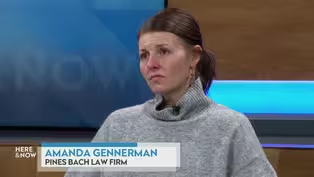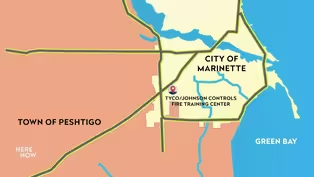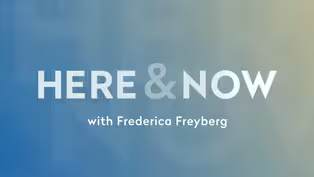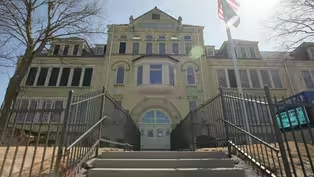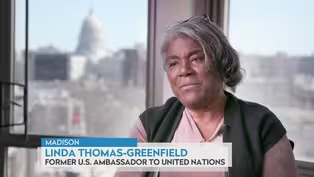Here and Now
Bobby Peterson on Medicaid Funding and Budgeting Blueprints
Clip: Season 2300 Episode 2339 | 6m 5sVideo has Closed Captions
Bobby Peterson on fears about Congress making cuts to Medicaid and the state budget.
ABC for Health Executive Director Bobby Peterson discusses fears about Congress making cuts to Medicaid and potential effects on recipients as the 2025-27 state budget process proceeds in Wisconsin.
Problems playing video? | Closed Captioning Feedback
Problems playing video? | Closed Captioning Feedback
Here and Now is a local public television program presented by PBS Wisconsin
Here and Now
Bobby Peterson on Medicaid Funding and Budgeting Blueprints
Clip: Season 2300 Episode 2339 | 6m 5sVideo has Closed Captions
ABC for Health Executive Director Bobby Peterson discusses fears about Congress making cuts to Medicaid and potential effects on recipients as the 2025-27 state budget process proceeds in Wisconsin.
Problems playing video? | Closed Captioning Feedback
How to Watch Here and Now
Here and Now is available to stream on pbs.org and the free PBS App, available on iPhone, Apple TV, Android TV, Android smartphones, Amazon Fire TV, Amazon Fire Tablet, Roku, Samsung Smart TV, and Vizio.
Providing Support for PBS.org
Learn Moreabout PBS online sponsorshipin Peshtigo and Marinette.
Nationally and here in Wisconsin, possible cuts to the health care program known as Medicaid have sparked fear in the low income families, elderly residents and people with disabilities who depend on it.
At a public hearing in West Allis, lawmakers on the state legislature's Joint Finance Committee heard from many about why Medicaid needs to be saved.
>> Medicaid programs allow persons with disabilities to live dignified life.
>> Medicaid really supports a healthy Wisconsin.
We have about half a million children in Wisconsin covered by Medicaid, which is about a third of Wisconsin's kids.
>> People are going to lose their insurance.
Rural and low income hospitals will close, and people will die.
>> Impassioned public testimony on Medicaid before the state budget writing committee.
And now that Congress has passed its budget blueprint, work begins in earnest in Washington to enact major tax cuts paid for with sharp reductions in federal programs that could hit the health care program.
As to Medicaid in Wisconsin, we turn to Bobbie Peterson, executive director of ABC for health, a nonprofit public interest law firm helping consumers navigate the health care system.
And Bobbie, nice to see you again.
>> Thanks for inviting me.
>> So one point that you really want to make clear is that cuts to Medicaid have not happened yet.
That's right.
With that in mind, what's your guidance?
>> Well, I think it's, you know, don't panic, but let your voice be heard.
I mean, Wisconsin people know that Medicaid is a very important program.
It state.
So that's families, friends, neighbors, a lot of folks out there that have potentially affected by this.
But it hasn't changed yet.
And there's opportunities to help influence the process, hopefully make it better.
And to avoid some of the serious issues that that we're concerned about and worried about.
But I think we're going to do our best to try and save them off.
>> So what kinds of coverage does Medicaid represent?
>> It covers, you know, long term care for seniors.
It covers people with disabilities.
It covers a lot of kids on Badgercare, plus some parents, childless adults.
So it's broad and wide.
And so I think if you, you know, you're most of our viewers will know someone who is getting Medicaid services.
This affects every corner of the state.
>> Why are people sounding the alarm on potential cuts?
Is that overstated?
>> No, I think it's important.
And even though it's characterized sometimes as we're not going to cut the benefits, just putting procedural hoops and hurdles in the path of people.
We've seen this before.
We see it even now, and it could get worse.
So bureaucratic red tape blockages to coverage, just making it harder for people to navigate these systems without effective strategies to help people through that system is the problem.
>> As you say, the Trump administration and GOP leaders say they will not cut Medicaid benefits.
They're going after waste, fraud and abuse.
But you were just talking about bureaucratic kind of red tape.
What could they do around eligibility requirements or other things like that to affect reductions?
put in require work requirements for certain Medicaid programs and that it's just the process, the paperwork getting through it.
People that may be ill may not be able to work.
You know, just going through that process deters people, knocks them off to the side.
They lose coverage and they're not getting important health care and coverage that they need with a consequence of running up medical bills and medical debt, which is something that we really want to try and avoid.
>> Now, Wisconsin, as you know, never expanded Medicaid and expanded Medicaid gave state.
The feds gave states 90% of those costs.
Wisconsin never expanded it.
So our share from the feds is 60%.
But with any reductions to Medicaid, could it still blow up, you know, kind of the state budget?
>> Sure.
I mean, I think that it depends if what Wisconsin, how we react to it, you know, but I think for the most part, it's going to be a situation where people are going to face most of the pain, not the budget as much, because I think a lot of folks out there are going to be deterred from getting the care and services that they need.
Their conditions will worse worsen, their health will worsen, and their medical debt will accumulate.
>> So if there are cuts, what are the implications to even those not covered by Medicaid when it comes to things like uncompensated care and hospitals, rural hospitals?
>> Sure.
I mean, they're under stress already.
Rural hospitals are under stress.
We've seen closures, rising levels of uncompensated care make it untenable for them to continue operations in some levels because it's just, you know, they're not meeting their bottom line and they can't provide the services that they need.
Rural hospitals are on very thin margins.
Most of them.
We know that in Wisconsin in 2023, the last year that that data is available, there was $1.4 billion in uncompensated care.
That's a lot.
But that's going to go up and it's going to affect more people with more bills and unpaid bills.
It's going to affect hospitals with unpaid bills.
It's a system issue.
>> And what does it mean?
Apart from uncompensated care to hospitals to people who are not on Medicaid, but otherwise covered by other health care.
>> Programs.
It's another one of the long term effects.
It's cost shifting.
So if we think about, you know, people talk sometimes about socialized medicine, I talk sometimes about socialized medical debt.
So if you think about all that debt that's unpaid, it doesn't just go away, but it gets spread out in the system to everybody else.
So we all have a price to pay when people don't have adequate people don't have adequate
Amanda Gennerman on Student Visa Revocations in Wisconsin
Video has Closed Captions
Clip: S2300 Ep2339 | 5m 40s | Amanda Gennerman on the government revoking visas of international students in Wisconsin. (5m 40s)
DNR Issues PFAS Advisories for 50 More Wells in Peshtigo
Video has Closed Captions
Clip: S2300 Ep2339 | 40s | The Wisconsin DNR issued PFAS advisories for 50 private wells in the town of Peshtigo. (40s)
Here & Now opening for April 11, 2025
Video has Closed Captions
Clip: S2300 Ep2339 | 1m 6s | The introduction to the April 11, 2025 episode of Here & Now. (1m 6s)
Lead Levels and Cleanup Costs Are High in Milwaukee Schools
Video has Closed Captions
Clip: S2300 Ep2339 | 7m 9s | Cleaning up lead paint and replacing pipes is one element in Wisconsin's 2025-27 budget. (7m 9s)
Ambassador Linda Thomas-Greenfield on Diplomacy and Politics
Video has Closed Captions
Clip: S2300 Ep2339 | 25m 33s | Linda Thomas-Greenfield on challenges and rewards of conducting international diplomacy. (25m 33s)
Providing Support for PBS.org
Learn Moreabout PBS online sponsorship
- News and Public Affairs

Top journalists deliver compelling original analysis of the hour's headlines.

- News and Public Affairs

FRONTLINE is investigative journalism that questions, explains and changes our world.












Support for PBS provided by:
Here and Now is a local public television program presented by PBS Wisconsin
